A-Z of the urban artforms in Jungle Book
Struggling to identify your krump from your breakdancing, your gangster rap from your grime. Well here is an A-Z of the diverse urban [and occasionally classical] art-forms used within our street dance and circus production of Jungle Book:
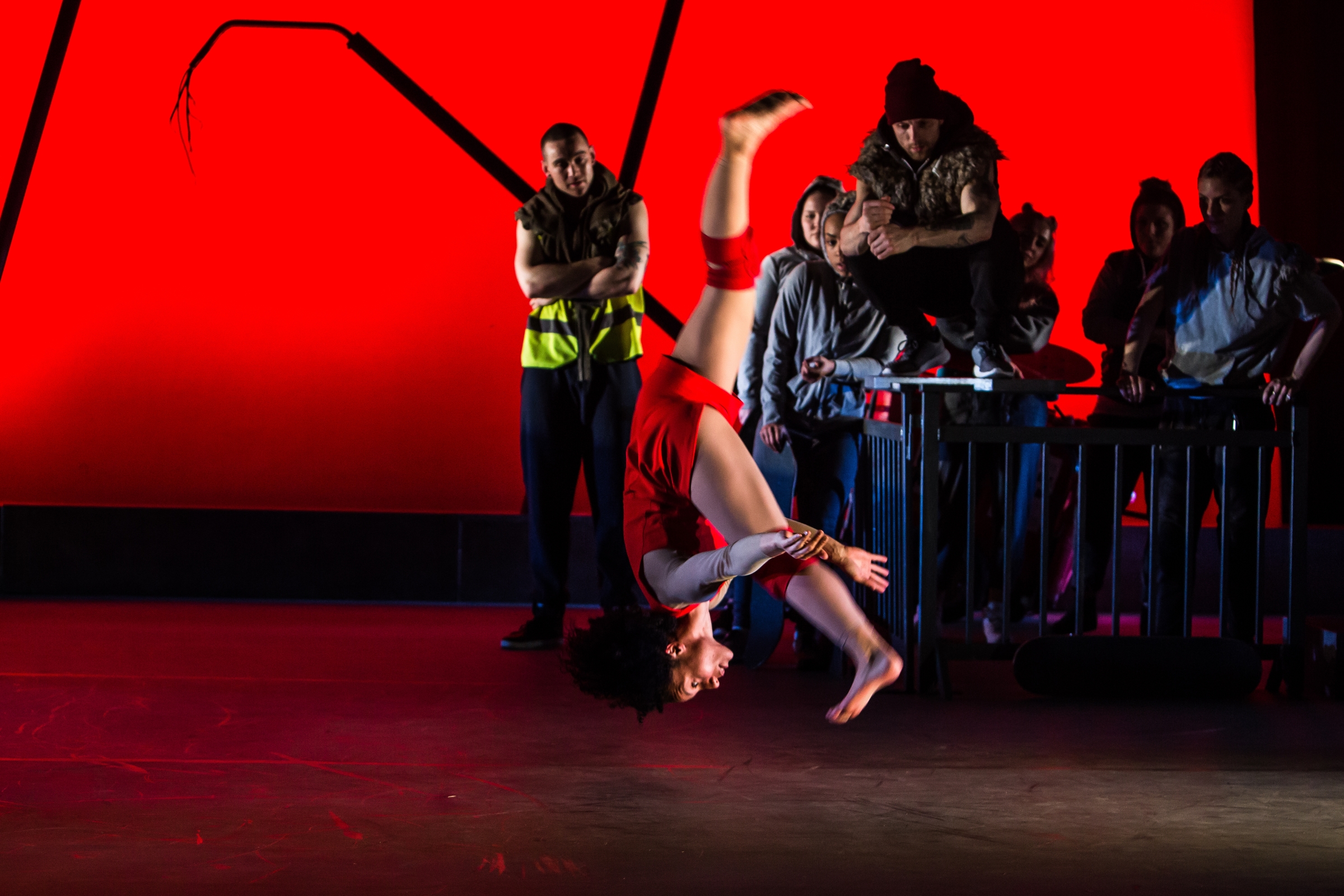 Acrobatics - Spectacular floor based gymnastic feats. In Jungle Book mostly used by Mowgli, but almost all the performers have some acrobatic moments in the show (the monkeys flip out, Kaa and Bagheera have an acrobatic chase sequence, and much of Akela's break-dance solo crosses over into acrobatics).
Acrobatics - Spectacular floor based gymnastic feats. In Jungle Book mostly used by Mowgli, but almost all the performers have some acrobatic moments in the show (the monkeys flip out, Kaa and Bagheera have an acrobatic chase sequence, and much of Akela's break-dance solo crosses over into acrobatics).

Aerial hoop - a metal hoop suspended from a single point (or sometimes two points) in and around which circus artists move, creating shapes in the air. In Jungle Book it symbolises the coin thrown to the homeless Vulture girl Vee. Our hoop sequence is a doubles hoop (because there are two of them) and it's also often performed as a solo act.
Ballet - a traditional dance form characterised by graceful movements and gestures. In Jungle Book, Mowgli  performs a short ballet sequence when Messua is trying to integrate her into the world of the suits.
performs a short ballet sequence when Messua is trying to integrate her into the world of the suits.
 Break-dancing (also known as B-Boy or B-Girl) - A form of non-rhythmic urban dance characterized by acrobatic and gymnastic movements. Akela and the wolves use break-dancing in Jungle Book, often on skateboards!
Break-dancing (also known as B-Boy or B-Girl) - A form of non-rhythmic urban dance characterized by acrobatic and gymnastic movements. Akela and the wolves use break-dancing in Jungle Book, often on skateboards!
Charleston -a vigorous, rhythmic ballroom dance popular in the 1920s. This is also performed by Mowgli when trying to fit into the suit world.
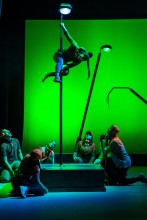
Chinese Pole - Chinese poles are rubberised vertical poles on which circus performers climb, slide down and hold poses. They can be static or spinning - ours does both! In Jungle Book Kaa the snake is a pole artist, combining Chinese Pole and shiny pole (pole dance - which uses a bare metal bar) technique.
Contemporary - a style of expressive dance that combines elements of several dance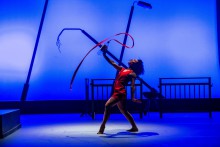 genres including modern, jazz, lyrical and classical ballet. Mowgli uses contemporary dance throughout Jungle Book, particularly when she discovers the ‘red flower’ that she can use against Shere Khan.
genres including modern, jazz, lyrical and classical ballet. Mowgli uses contemporary dance throughout Jungle Book, particularly when she discovers the ‘red flower’ that she can use against Shere Khan.
Dance trapeze - a form of aerial circus where an artist performs on a horizontal bar suspended by two ropes. A dance trapeze (sometimes known  as a single point trapeze) is rigged to a single point so that it can spin, sometimes very very fast. Mowgli conjures the 'red flower' on a double bar dance trapeze.
as a single point trapeze) is rigged to a single point so that it can spin, sometimes very very fast. Mowgli conjures the 'red flower' on a double bar dance trapeze.
Fosse - a choreographic  style based on the choreographer Bob Fosse. The waiters in the restaurant combine locking with a Fosse posture.
style based on the choreographer Bob Fosse. The waiters in the restaurant combine locking with a Fosse posture.
 Funk - a dance genre that uses a mixture of soul music, jazz, and rhythm and blues (R&B). Baloo uses funk when trying to persuade the wolves to accept Mowgli.
Funk - a dance genre that uses a mixture of soul music, jazz, and rhythm and blues (R&B). Baloo uses funk when trying to persuade the wolves to accept Mowgli.
Gangster Rap - Gangsta rap or  gangster rap is a subgenre of hip hop music with themes and lyrics based on the "thug" or "gangsta" lifestyle. In Jungle Book Shere Khan is a Gangster rapper.
gangster rap is a subgenre of hip hop music with themes and lyrics based on the "thug" or "gangsta" lifestyle. In Jungle Book Shere Khan is a Gangster rapper.

Graffiti - a style of writing or drawing often sprayed in a public place as a form of artistic expression. In Jungle Book, Bagheera is a graffiti artist panther.
Grime - a form of rap music influenced by UK garage, characterized by machine-like sounds. In Jungle Book the monkeys are a grime crew, spitting about how they are shunned by the rest of society.
In Jungle Book the monkeys are a grime crew, spitting about how they are shunned by the rest of society.
Hip hop - a style of popular music and dance featuring rap with an electronic backing. It is also used as an umbrella term for the many subgenres or urban or street dance. Hip hop styles are used throughout Jungle Book.

Krump - a dance style which is characterised by exaggerated, and highly energetic movement including stamping. Shere Khan uses krumping to depict his anger and struggle when he has been arrested.
Locking (see popping) - a style of funk dance, which includes freezing from a fast movement and "locking" in a certain position. The Suits movement is based on locking to show their robotic characteristics.
Parkour [also known as free-running]  - Parkour is a discipline using movement which aims to get from one point to another in a complex environment, without any equipment. Bagheera uses lamp posts and railings for parkour in Jungle Book.
- Parkour is a discipline using movement which aims to get from one point to another in a complex environment, without any equipment. Bagheera uses lamp posts and railings for parkour in Jungle Book.
 Popping (see locking) - a street dance style which goes hand in hand with locking. It is based on the technique of quickly contracting and relaxing muscles to cause a jerk in the dancer's body. It is also used by the suits to add to their robotic appearance.
Popping (see locking) - a street dance style which goes hand in hand with locking. It is based on the technique of quickly contracting and relaxing muscles to cause a jerk in the dancer's body. It is also used by the suits to add to their robotic appearance.
Puppetry - a classical art form in which performers manipulate an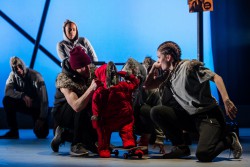 inanimate object to give it the semblance of life. Baby Mowgli is a stick and rod puppet, designed to be manipulated by multiple puppeteers - rather like the traditional Japanese bunraku puppets who have three operators - one on the head and right hand, one on the back and left hand and one on the feet.
inanimate object to give it the semblance of life. Baby Mowgli is a stick and rod puppet, designed to be manipulated by multiple puppeteers - rather like the traditional Japanese bunraku puppets who have three operators - one on the head and right hand, one on the back and left hand and one on the feet.
Rap (see gangster rap and grime) - a type of popular music in which words are recited rapidly and rhythmically over an instrumental backing. In Jungle Book, Shere Khan is a gangster rapper.

Skateboarding - the sport or pastime of riding on a skateboard. Akela, Raksha and the wolves are a skateboarding pack and often break dance on them.
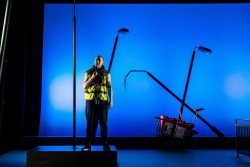 Spoken word - an oral art that focuses on the aesthetics of word play and intonation and voice inflection. It is a 'catchall' that includes any kind of poetry recited aloud, including hip-hop, jazz poetry, poetry slams, traditional poetry readings and can include comedy routines and 'prose monologues’. In Jungle Book Baloo uses spoken word narration to explain the story of the show.
Spoken word - an oral art that focuses on the aesthetics of word play and intonation and voice inflection. It is a 'catchall' that includes any kind of poetry recited aloud, including hip-hop, jazz poetry, poetry slams, traditional poetry readings and can include comedy routines and 'prose monologues’. In Jungle Book Baloo uses spoken word narration to explain the story of the show.
Street dance - a 'street dance' is a dance style that evolved outside dance studios in any available open space such as streets, dance parties, block parties, parks, school yards, raves, and nightclubs. The term is used to describe vernacular dances in urban context, and like 'hip-hop’ serves as an umbrella term for many subgenres.
Urban - Any of various dances influenced by the rhythms and techniques of funk and hip-hop music, such as locking, popping, or b-boying.
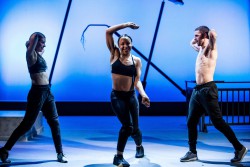
Vogueing - dance to music in such a way as to imitate the characteristic poses struck by a model on a catwalk. In Jungle Bagheera uses Vogueing [and waacking]
 Waltz - a dance in triple time performed by a couple; this is another dance form which Mowgli performs when trying to fit into the suits world.
Waltz - a dance in triple time performed by a couple; this is another dance form which Mowgli performs when trying to fit into the suits world.
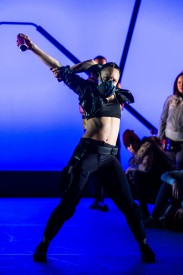
Waacking - a form of dance which consists of moving the arms to the music beat,typically in a movement of the arms over and behind the shoulder. Waacking also contains other elements such as posing and footwork. Bagheera uses waacking throughout the production, with her spray can in her hand ready to graffiti the streets.
 As we're now deep into summer holidays the children will be pretty much permanently in attendance during the next three weeks when we take over London Wonderground. It helps of course that Jungle Book is a family title so there will be hundreds of other children also running amok, so we've also decided to deck the kids out in some bespoke Metta branded t-shirts to help us keep tabs on them all among the melee.
As we're now deep into summer holidays the children will be pretty much permanently in attendance during the next three weeks when we take over London Wonderground. It helps of course that Jungle Book is a family title so there will be hundreds of other children also running amok, so we've also decided to deck the kids out in some bespoke Metta branded t-shirts to help us keep tabs on them all among the melee. I've long extolled the virtues of babies in meetings - ours have been in countless meetings with venues, funders - in several instances our Arts Council Relationship Manager meeting us in playgrounds to accommodate this - even on occasion with potential cast members. Not everyone is as happy mixing their professional and personal lives - as someone who runs a company with her husband that was always going to be a given for me. Including our family in the process of making theatre has enriched our work, has enriched our brand (several years later there are still venues who remember us as 'the ones with the baby') and has enriched the lives of our children who are exposed to an extraordinary range of experiences and are also now highly fluent in circus terminology.
I've long extolled the virtues of babies in meetings - ours have been in countless meetings with venues, funders - in several instances our Arts Council Relationship Manager meeting us in playgrounds to accommodate this - even on occasion with potential cast members. Not everyone is as happy mixing their professional and personal lives - as someone who runs a company with her husband that was always going to be a given for me. Including our family in the process of making theatre has enriched our work, has enriched our brand (several years later there are still venues who remember us as 'the ones with the baby') and has enriched the lives of our children who are exposed to an extraordinary range of experiences and are also now highly fluent in circus terminology.

 bility and they may end up feeling like a burden. From the first day here at Metta, I have been welcomed with open arms and handed responsibilities as if they trusted me simply by the smile and eager look on my face. I have been doing tasks that range from emailing theatre contacts in regards to our tour of Jungle Book to analyzing sales reports, knitting and hand sewing props for our upcoming production of Blown Away, to interviewing audience members in Oxford after finally seeing Jungle Book for the first time.
Now that I have finally seen Jungle Book and processed all my emotions and thoughts on it, I must say that it is an incredible spectacle of dance and unlike any production I have seen in my life. I never knew the depth of attention that is required to keep a theatre company running, let alone thriving. Knowing how much goes into helping this production tour across England and Ireland, I have so much more respect for the administrative work that Anthea, Poppy, and Will tirelessly powered through to make this tour run as smoothly as possible. Despite the small imp
act that I had on Jungle Book, every bit that I can pitch in and help out with is met with enthusiasm and appreciativeness from the entire team. At times, it can feel a bit like I have been asked to paint a Fresco after having one introductory painting class, but with every stroke of my brush, I feel more confident and I can see the impact of my hard work; that has made an incredible difference in me.
bility and they may end up feeling like a burden. From the first day here at Metta, I have been welcomed with open arms and handed responsibilities as if they trusted me simply by the smile and eager look on my face. I have been doing tasks that range from emailing theatre contacts in regards to our tour of Jungle Book to analyzing sales reports, knitting and hand sewing props for our upcoming production of Blown Away, to interviewing audience members in Oxford after finally seeing Jungle Book for the first time.
Now that I have finally seen Jungle Book and processed all my emotions and thoughts on it, I must say that it is an incredible spectacle of dance and unlike any production I have seen in my life. I never knew the depth of attention that is required to keep a theatre company running, let alone thriving. Knowing how much goes into helping this production tour across England and Ireland, I have so much more respect for the administrative work that Anthea, Poppy, and Will tirelessly powered through to make this tour run as smoothly as possible. Despite the small imp
act that I had on Jungle Book, every bit that I can pitch in and help out with is met with enthusiasm and appreciativeness from the entire team. At times, it can feel a bit like I have been asked to paint a Fresco after having one introductory painting class, but with every stroke of my brush, I feel more confident and I can see the impact of my hard work; that has made an incredible difference in me. that I am more than just a silly twenty-something who majored in theatre and has limited job prospects when I enter the real world. This internship and my theatre education has taught me that I can handle anything thrown at me and the skills I have obtained during my education will allow me to go anywhere and do anything if I set my mind to it. I may just need to trust the guidance of a few painting masters along the way.
that I am more than just a silly twenty-something who majored in theatre and has limited job prospects when I enter the real world. This internship and my theatre education has taught me that I can handle anything thrown at me and the skills I have obtained during my education will allow me to go anywhere and do anything if I set my mind to it. I may just need to trust the guidance of a few painting masters along the way.

















